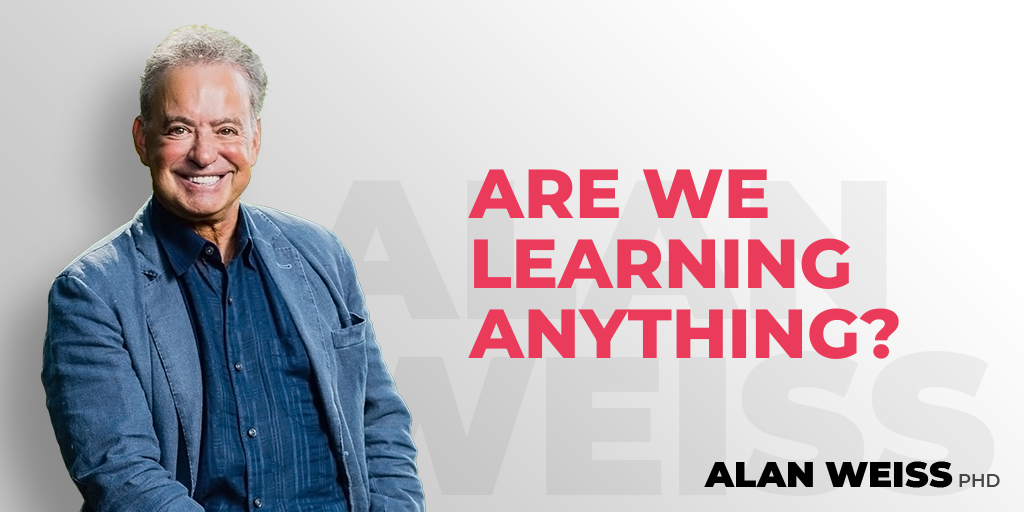The Psychology of Doom
Let me talk to you about what I call the “psychology of doom.”
This occurs when problems are encountered and people immediately assume the worst for themselves, for those around them, and for the country. I heard a speaker a couple of years ago (when the economy was much better than it is today, by the way) stand on a stage and bemoan the economy, as the audience joined in a round of moans, and acclamations of “Right!” and “Yes!”
When I spoke later, I pointed out that a lot of people were doing quite well, thank you very much, and therefore it probably was not the economy (nor technology, nor competition, nor Dick Cheney). A couple of dozen people applauded, and I immediately knew they were the ones who were not engaged in the psychology of doom.
GM is floundering because of world-class stupid management. The sub-prime mess was jointly caused by predatory lending and people who used virtually no prudence about how much debt they could take on. (It’s always someone else’s fault, which is a victimization mentality, a part of the psychology of doom, along with the poverty mentality that accompanies victimization.) The airlines can’t even get flights off on time on a beautiful day during non-rush periods, because they schedule flights so imprudently, so let’s not blame oil prices for their lack of planning. (Did anyone believe that oil prices would go DOWN in the long term??) We’ve wanted to reduce petroleum usage for a long time, yet the government has refused to change the support of highways and infrastructure from gas taxes, and is now unable to build and maintain roads properly.
Gas prices have been high in most of the rest of the world, oh, let’s see: forever. France has used nuclear energy to great advantage for a long time. (Paris now provides brief-duration rented bikes which are so popular that they are introducing rented electric cars.) Germany has long allowed for high speed limits, despite high fuel prices. Brazil is enjoying an economic Renaissance.
Newspapers are having very tough times, but a great many technology companies are thriving. (Basically, that’s because newspapers are dreadfully run—often by families with no great expertise other than inheritance—and they’ve been “fearing” electronic competition for 20 years! One would think that’s long enough to have successfully responded, but apparently that’s just the blink of an eye in journalism.)
I’m telling you that people are mostly subject to their own judgment, abilities, decisions, and discipline, whether deciding for themselves, for their companies, or for their governments.
When people are engaged in a psychology of doom, guess what? Things promptly get “worse.” Why? Because: 1) They pull back from spending, investing, prudent risk, innovation, travel, professional development, and personal growth; and 2) They actively look for signs of doom to validate their position of hiding behind a rock, and refuse to look at obvious signs of opportunity and growth by which certain others thrive.
I’m fortunate in that I deal with corporate clients and individual mentorees who are doing quite well, based on their talent and attitudes. I reinforce them, they reinforce me.
Doom and gloom don’t have membership cards to that club. And there isn’t a victim amongst us.
© Alan Weiss 2008. All rights reserved.







Bob Ligget
While common sense may not be common practice, it’s still very nice to read some when available. How about submitting this to the editorial pages of major newspapers (well, they might have trouble admitting to that one paragraph)or other media outlets? I’m guessing there would be a loud chorus of cheers across the land from those looking in vain for this view to be expressed.
Wayne Botha
Automakers in the USA have convinced consumers that great obstacles are preventing vastly improved gas consumption. Hybrid vehicles are more expensive than gas-only engines. We hear that it is impractical to create a hydrogen supplying infrasture. As a consumer in the USA, I am given the impression that Automakers are doing everything possible to deliver gas-thrifty cars to the public. The only option currently is to offer a plan with certain new cars to subsidize your gas so that you will only pay $2.99 per gallon for the first few years.
In South Africa, Audi sedan drivers are getting over 600 miles to a tank of diesel. How is this possible you may ask? Can a mass produced car really achieve this consumption without “hyper-miling” driving techniques such as disconnecting your A/C? Yes. These turbocharged diesel cars are available and being driven at higher speeds than common in the USA, with all the creature comforts that we are accustomed to.
I don’t understand the reluctance to market such technology in the USA. Perhaps as consumers we are not yet hurting enough to demand better consumption? Perhaps when gas goes to $12 per gallon we will become more interested?